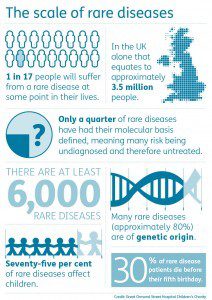 A rare disease is defined as one that affects less than 1 in 2,000 of the general population.
A rare disease is defined as one that affects less than 1 in 2,000 of the general population.
There are between 5,000 and 8,000 known rare diseases. 1 in 17 people, or 7% of the population, will be affected by a rare disease at some point in their lives. This is about 3 million people in the UK.
In the UK, a single rare disease may affect up to about 30,000 people. The vast majority of rare diseases will affect far fewer than this. Rare diseases include rare cancers such as childhood cancers, and some other well-known conditions such as cystic fibrosis and Huntington’s disease.
80% of rare diseases have a genetic component.
In about 80% of rare diseases, changes to DNA are involved in the cause.
In the 100,000 Genomes Project we are recruiting people with rare genetic disease who do not have a molecular diagnosis. A molecular diagnosis is one where the exact cause of the disease is identified.
Doctors will know that the disease is genetic, based on family history or symptoms. They will have clues about the cause. A patient may have had several genetic tests already. In these standard genetic tests, changes in specific genes are looked for.
Because only specific changes are looked for, if they are not there, the cause remains a mystery.
With whole genome sequencing in the 100,000 Genomes Project we look at every letter of DNA in a person’s genome. This gives us more chance of finding the change that is responsible for causing a disease.
Why do changes in DNA cause rare disease?
DNA contains the instructions for making the proteins our bodies are built of – from the keratin in hair and fingernails to the antibody proteins that fight infection.
A change to DNA means a change to proteins. For example, this could be how the protein is built, or the amount of it that is made. Sometimes a change means that a protein doesn’t work properly. It could work too slowly, too quickly or not in the right way. If the protein is found in lots of areas of the body, then it could cause lots of different problems.

